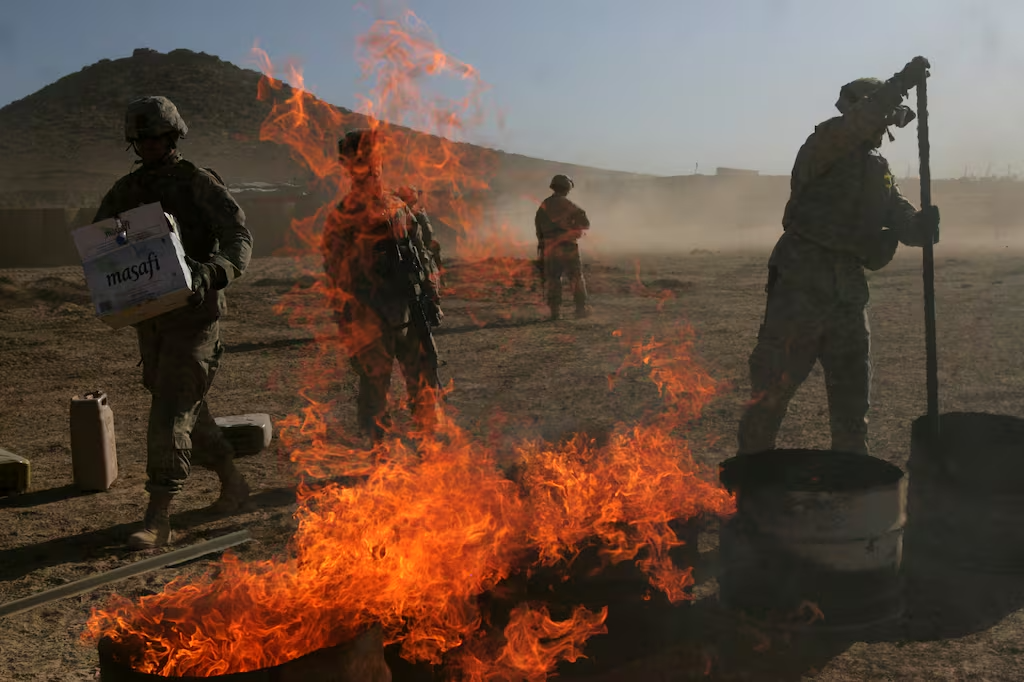Burn Pit Exposure and the Emerging Link to Serious Brain Injuries
Understanding Burn Pit Exposure
During deployments in Iraq and Afghanistan from 2001 to 2011, U.S. military personnel were often stationed near open-air burn pits—massive fires used to dispose of waste including plastics, medical waste, electronic equipment, munitions, fuels, and human waste. These pits emitted toxic smoke containing dioxins, particulate matter (PM2.5/PM10), volatile organic compounds, and known carcinogens—creating hazardous living environments for nearby troops.
The 2025 Study: What New Research Shows
A landmark study, conducted by the National Institutes of Health in collaboration with the Department of Defense and VA, analyzed the service‑ and medical‑records of nearly 440,000 troops deployed during that period.
Key findings include:
-
Troops stationed near burn pits for 129 days or more were 27% more likely to report severe stress, and 37% more likely to sustain intracranial injuries, compared with those at burn‑pit‑free locations.
-
Service members with 474 days or more of exposure had a 68% higher risk of severe stress and a 124% increased risk of intracranial wounds.
-
Elevated rates of depression, mood disorders, traumatic brain injury (TBI) and other serious neurological conditions were also observed in exposed individuals.
Researchers caution that while the study shows a strong statistical association, it does not prove causality—largely because specific chemical exposure levels were not documented at individual bases.
Why These Findings Matter
This is the first large-scale epidemiological study suggesting that persistent exposure to burn pit smoke may increase the risk of brain and mental health injuries, not only lung and cardiovascular diseases. Prior research focused mainly on respiratory effects or immune-system suppression, but this study connects cumulative exposure with brain trauma and mental health disorders.
For veterans, these findings offer additional validation that chronic symptoms—such as headaches, memory problems, mood changes, or anxiety—are not psychological in origin, but may have tangible physical roots tied to deployment environment.
What to Do If You’re a Veteran with Burn Pit Exposure
1. Register Your Exposure
Enroll in the VA’s Airborne Hazards and Open Burn Pit Registry to document your exposure and health conditions. While registration alone is free and not a VA claim, it supports both research and later compensation efforts.
2. Consider Filing a VA Disability Claim Under the PACT Act
The PACT Act (Promoting the PACT Act of 2022) expanded benefits for burn pit exposure. While mental health conditions and traumatic brain injuries are not listed as presumptives, respiratory diseases, certain cancers, and cardiovascular conditions are included.
Still, if your brain‑related symptoms can be linked to exposure, you may qualify under individual service‑connection claims. The new research strengthens such claims—with documented cumulative exposure and medical records, your odds of success improve.
3. Gather Evidence and Medical Records
Documentation is critical. If you served in locations where burn pits were operated (including Iraq, Afghanistan, Kuwait, Djibouti, Syria, and others), note your exact deployment dates, proximity to burn pits, and duration of exposure. Also collect medical records showing diagnoses like TBI, mood disorders, memory loss, depression, or other neurological symptoms. The longer your documented exposure, the stronger the statistical association becomes.
4. Seek Legal Assistance from Veterans‑Experienced Attorneys
At Avard Law Offices, we specialize in VA disability, PACT Act claims, and related appeals. Our attorneys are Board Certified and VA‑Accredited, with deep experience handling burn‑pit exposure cases in South Florida, including Cape Coral and Fort Myers. We can assist in compiling exposure histories, medical documentation, and service records—and represent you through VA claim procedures and appeals if necessary.
Why This Matters for Clients of Avard Law Offices
-
Updated scientific backing: The 2025 NIH study provides concrete statistical associations between burn pit smoke and brain injuries that were previously speculative.
-
New legal strategies: While mental health or TBI are not presumptive conditions yet, the scientific link can be leveraged in service‑connection claims.
-
Tailored support: Avard Law Offices can guide you through registry enrollment, gathering necessary evidence, preparing a strong VA disability claim, and litigating if needed.
Bottom Line for Clients
If you:
-
Served near burn pits for many months during OIF/OEF deployments, and
-
Have been diagnosed with or are suffering from depression, anxiety, memory loss, mood changes, headaches, or TBI,
…then you now have scientific epidemiological evidence supporting a relationship between your exposure and your health problems. This strengthens your eligibility for VA disability benefits, and you should strongly consider a claim.
Contact Avard Law Offices
We offer free consultations for veterans with burn pit exposure concerns. With offices across Florida, including Cape Coral, Fort Myers, Naples, and more, our team is ready to assist you every step of the way. Call (239) 945‑0808 or visit our website to schedule your consultation today.
At Avard Law Offices, we care deeply about ensuring veterans receive the recognition, benefits, and care they deserve. You are not alone—and we are here to help you build your case.

